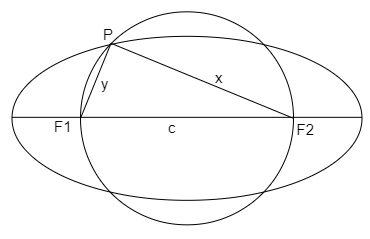Question
Question: A circle has the same Centre as an ellipse and passes through the foci \[{F_1}\] and \[{F_2}\] of th...
A circle has the same Centre as an ellipse and passes through the foci F1 and F2 of the ellipse, such that the two curves intersect in four points. Let P be any one of their points of intersection. If the major axis of the ellipse is 17 and the area of triangle PF1F2 is 30, then the distance between the foci is
(A) 13
(B) 10
(C) 11
(D) None of these
Solution
We will first find the radius of the given circle in terms of major axis and eccentricity. Then we will equate this radius to the given value of radius to obtain an equation in terms of x , y , major axis and minor axis. With the help of this equation, we will find the value of y , and then we will use this value of y to find the area of the triangle PF1F2 . Equating this to the given area will give the value of major axis and minor axis, using these values in the required equation will give the distance between the foci.
Complete step-by-step solution:
We know that the equation of ellipse is
a2x2+b2y2=1−−−(1)

Also, it is given in the question that the centre of the circle is same as that of the ellipse and it passes through the foci of the ellipse, therefore, the radius of the circle is:
r=ae
Now we will put the value of e in the above equation. So,
r=a1−a2b2
⇒r=a2−b2
Now replacing r with x2+y2 , we get,
x2+y2=a2−b2
So, the equation of circle becomes,
x2+y2=a2−b2
⇒x2=a2−b2−y2−−−(2)
Substituting the value of x2 from this equation into equation (1) , we get,
a2a2−b2−y2+b2y2=1
⇒1+b2y2−a2b2+y2=1
On further simplification it becomes,
⇒b2y2=a2b2+y2
On cross-multiplication,
⇒y2a2=b2(b2+y2)
On rearranging it becomes,
(a2−b2)y2=b4
⇒y2=(a2−b2)b4
On taking square-root of both sides,
⇒∣y∣=a2−b2b2
Now, area of triangle is =21∣y∣(F1F2)
=21∣y∣(2ae)
On putting the values of r and ae we get,
Area of triangle =21×a2−b2b2×2a2−b2
=b2
But it is given that the area of the triangle is 30 . So,
b2=30
Also, it is given that 2a=17
Now we know that:
F1F2=2ae
⇒F1F2=2a2−b2
Now, putting the values of a2 and b2 , we get,
⇒F1F2=2(22172−30)
⇒F1F2=2(4289−120)
On further simplification it becomes,
⇒F1F2=(169)
⇒F1F2=13
Note: One of the major problems that one can have in these types of questions is that they get confused in the formula for eccentricity. Whether it is e=1−a2b2 or e=1−b2a2 . Actually, it is e=1−(major - axis)2(minor - axis)2 .
